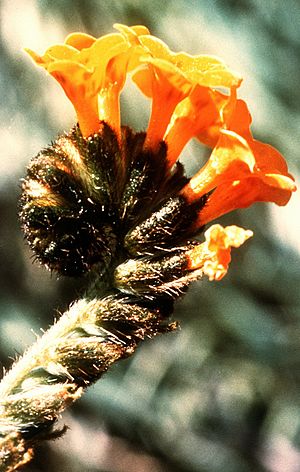Large-flowered fiddleneck facts for kids
Quick facts for kids Large-flowered fiddleneck |
|
|---|---|
 |
|
| Conservation status | |
| Scientific classification |
|
| Kingdom: | Plantae |
| Clade: | Tracheophytes |
| Clade: | Angiosperms |
| Clade: | Eudicots |
| Clade: | Asterids |
| Order: | Boraginales |
| Family: | Boraginaceae |
| Genus: | Amsinckia |
| Species: |
A. grandiflora
|
| Binomial name | |
| Amsinckia grandiflora (Kleeb. ex A.Gray) Kleeb. ex Greene
|
|
| Script error: The function "autoWithCaption" does not exist. | |
Script error: No such module "Check for conflicting parameters".
Amsinckia grandiflora, often called the large-flowered fiddleneck, is a special kind of wildflower. It's found only in California, which means it is endemic to the state. This plant is considered a critically endangered species, both in California and across the United States. This means it's at a very high risk of disappearing forever.
Contents
Where Does the Large-Flowered Fiddleneck Live?
The last natural groups of large-flowered fiddleneck plants grow in the grasslands near the Lawrence Livermore National Laboratory in Alameda County, California. Scientists have also planted new groups in protected areas nearby to help them survive.
Why is This Plant Endangered?
Several things make this fiddleneck plant endangered. One big problem is invasive plants. These are plants that are not native to the area and can take over, pushing out the native fiddleneck. Other threats include animals grazing too much and new buildings or developments being built on the land where the plant lives.
How Does This Fiddleneck Reproduce?
The large-flowered fiddleneck has a hard time making new plants. It produces very few seeds, which makes it difficult for new plants to grow.
Challenges in Reproduction
This plant is also heterostylous, which means its flowers have different shapes. This can make it hard for the plant to reproduce with itself. It is self-incompatible, meaning a plant cannot breed with another plant of the exact same flower shape. This often stops new seeds from forming.
What Kind of Habitat Does It Need?
The large-flowered fiddleneck is very picky about where it grows. It needs a specific type of soil called sedimentary loam. This soil is made from tiny bits of rock and dirt that have settled over time. The plant also prefers mesic areas, which are places that have a moderate amount of moisture.
Scientists at the Livermore Laboratory are carefully watching these plants. They want to make sure the large-flowered fiddleneck can survive and thrive in its native California home.
 | Georgia Louise Harris Brown |
 | Julian Abele |
 | Norma Merrick Sklarek |
 | William Sidney Pittman |


